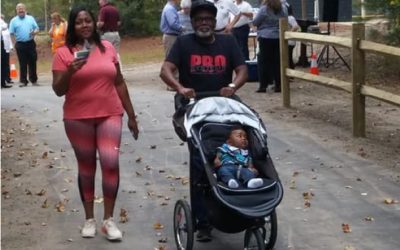Tall Longleaf pines stood silent guard as the first official hikers took to the Sweet Gum Trail in Camden on Tuesday afternoon. About 50 people participated in a ribbon-cutting ceremony for the official opening of the 2/3-mile trail that now connects Scott and Woodward parks.
Impact
South Carolina Teens Attend HYPE Project’s Youth Summit at SC State University
Close to 160 teenagers and adults from across South Carolina attended the 5th Annual Youth Summit on July 15 at SC State University to learn about youth-led policy changes and how to advocate effectively.
Small Businesses, Local Economies Reap the Benefits of Active Communities
Ten South Carolina municipalities are experiencing a growing economy thanks to pedestrian- and bicycle-friendly infrastructure improvement projects.



